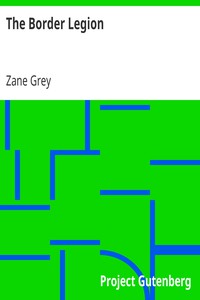The U. P. Trail by Zane Grey (historical books to read TXT) 📗

- Author: Zane Grey
Book online «The U. P. Trail by Zane Grey (historical books to read TXT) 📗». Author Zane Grey
Discontent and longing, and then hate, passed into oblivion. These useless passions could not long survive in such an environment. By and by the old trapper’s only link with the past was memory of a stalwart youth, and of a girl with violet eyes, and of their sad and wonderful romance, in which he had played a happy part.
The rosy dawn, the days of sun and cloud, the still, windy nights, the solemn stars, the moon-blanched valley with its grazing herds, the beautiful wild mourn of the hunting wolf and the whistle of the stag, and always and ever the murmur of the stream—in these, and in the solitude and loneliness of their haunts, he found his goal, his serenity, the truth and best of remaining life for him.
37
A band of Sioux warriors rode out upon a promontory of the hills, high above the great expanse of plain. Long, lean arms were raised and pointed.
A chief dismounted and strode to the front of his band. His war-bonnet trailed behind him; there were unhealed scars upon his bronze body; his face was old, full of fine, wavy lines, stern, craggy, and inscrutable; his eyes were dark, arrowy lightnings.
They beheld, far out and down upon the plain, a long, low, moving object leaving a trail of smoke. It was a train on the railroad. It came from the east and crept toward the west. The chief watched it, and so did his warriors. No word was spoken, no sign made, no face changed.
But what was in the mind and the heart and the soul of that great chief?
This beast that puffed smoke and spat fire and shrieked like a devil of an alien tribe; that split the silence as hideously as the long track split the once smooth plain; that was made of iron and wood; this thing of the white man’s, coming from out of the distance where the Great Spirit lifted the dawn, meant the end of the hunting-grounds and the doom of the Indian. Blood had flowed; many warriors lay in their last sleep under the trees; but the iron monster that belched fire had gone only to return again. Those white men were many as the needles of the pines. They fought and died, but always others came.
The chief was old and wise, taught by sage and star and mountain and wind and the loneliness of the prairie-land. He recognized a superior race, but not a nobler one. White men would glut the treasures of water and earth. The Indian had been born to hunt his meat, to repel his red foes, to watch the clouds and serve his gods. But these white men would come like a great flight of grasshoppers to cover the length and breadth of the prairie-land. The buffalo would roll away, like a dust-cloud, in the distance, and never return. No meat for the Indian—no grass for his mustang—no place for his home. The Sioux must fight till he died or be driven back into waste places where grief and hardship would end him.
Red and dusky, the sun was setting beyond the desert. The old chief swept aloft his arm, and then in his acceptance of the inevitable bitterness he stood in magnificent austerity, somber as death, seeing in this railroad train creeping, fading into the ruddy sunset, a symbol of the destiny of the Indian—vanishing—vanishing—vanishing—





Comments (0)